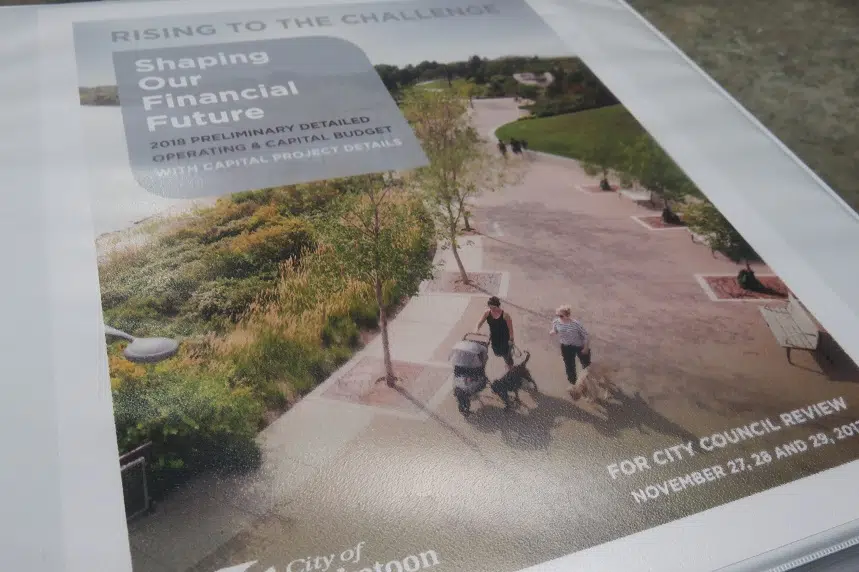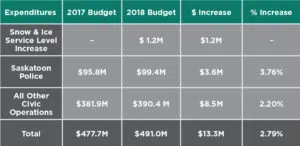Saskatoon city council was presented with the 2018 preliminary budget Monday afternoon, with councillors staring down a 4.96 per cent property tax increase before deliberations start in November.
City administration said the tax hike would help raise an additional $10.9 million to fund larger budgets for police and snow removal, as well as fill the gap left by the provincial budget.
According to documents released by the city Monday, the average homeowner would pay $86.37 more on their annual property tax bill, based on a property value assessment of $371,000.
Budget officials are laying blame for more than half of the tax increases on changes to the grants-in-lieu program made by the province in the spring, as well as lower provincial sales tax transfer payments.
“I wouldn’t say we could handle another major cut,” Kerry Tarasoff, Saskatoon’s Chief Financial Officer, said.
“We’ve handled it as best we can for now. We’re hoping things will be better with the provincial government and stabilize our revenues.”
Tarasoff noted $6.1 million of the new tax revenues would go towards replacing the provincial funding, translating to $48.41 of the total hike.
The CFO said the cuts didn’t leave them room for much else.
“This budget is not a sexy budget,” he said. “There’s not much left for us to make major changes to any programs.”
Police budget gets boost for pay increases
Among the only big increases in the city’s budget is a nearly $2.6-million boost to the Saskatoon Police Service.
Budget documents show the bulk of the new funding for police will be applied to staff compensation, due to a large number of “less experienced” employees moving to higher pay levels.
The police service is also planning to hire an additional public affairs employee to help “improve the timeliness and frequency of social media interactions.”
Increased revenues, partially from fines and record checks, are estimated to provide $672,000 in relief to offset some of the higher payroll expenses.
Police didn’t ask the city to fund any additional officers.
On top of the taxpayer-funded $2.6 million, the police service will also receive an approximate $700,000 from the provincial and federal governments, as well as private companies, to fund special programs and policing contracts.
Meanwhile, the Saskatoon Fire Department is set for a $900,000 budget increase to improve their dispatch system and to purchase new equipment due for replacement.
Snow and ice levy, other departments account for rest
Another $1.2 million of the new taxes are pegged to fund the city’s snow and ice management levy, with a goal to continue improving snow removal across Saskatoon.
Of that, $255,400 would be spent on hiring staff dedicated to snow removal, while the rest would go towards contracting.
City council approved expanding the snow removal program in 2016, with a planned 0.55 per cent increase to property taxes over several years to accommodate the new services.
However, councillors voted to defer the 2017 budget contribution in the wake of provincial budget cuts to limit impact on property taxes.
Besides police, fire and snow removal, all other city operations are planning a combined $122,000 in new expenses for 2018 funded by the taxpayer.
Across all departments, administration said the 2018 budget included allocations for 29.7 new full-time equivalent (FTE) staffing hires.
Tarasoff said the new hires, including 5.4 FTEs for the Remai Modern, are essential to maintaining city services.
The recommended tax increase is just over two per cent lower than first proposed in May, when administration had assessed the impacts of the provincial budget cuts.
Since then, the city said they’ve worked to find as many efficiencies as possible to bring down the cost to Saskatoon residents.
Council will go through the budget line-by-line over three days, Nov. 27-29, to determine the tax rate for people living in the city.
There, they’ll have the option of applying an additional $825,000 in savings found by administration since the printing of the preliminary budget to lower the tax increase to 4.59 per cent.
However, Tarasoff said those savings could be wiped out to account for street sweeping costs not included in the budget.
The increases come after taxpayers saw their bills rise by an average of $44 in 2017, as council raised parking fines and deferred the snow and ice management levy to cope with the provincial changes.










